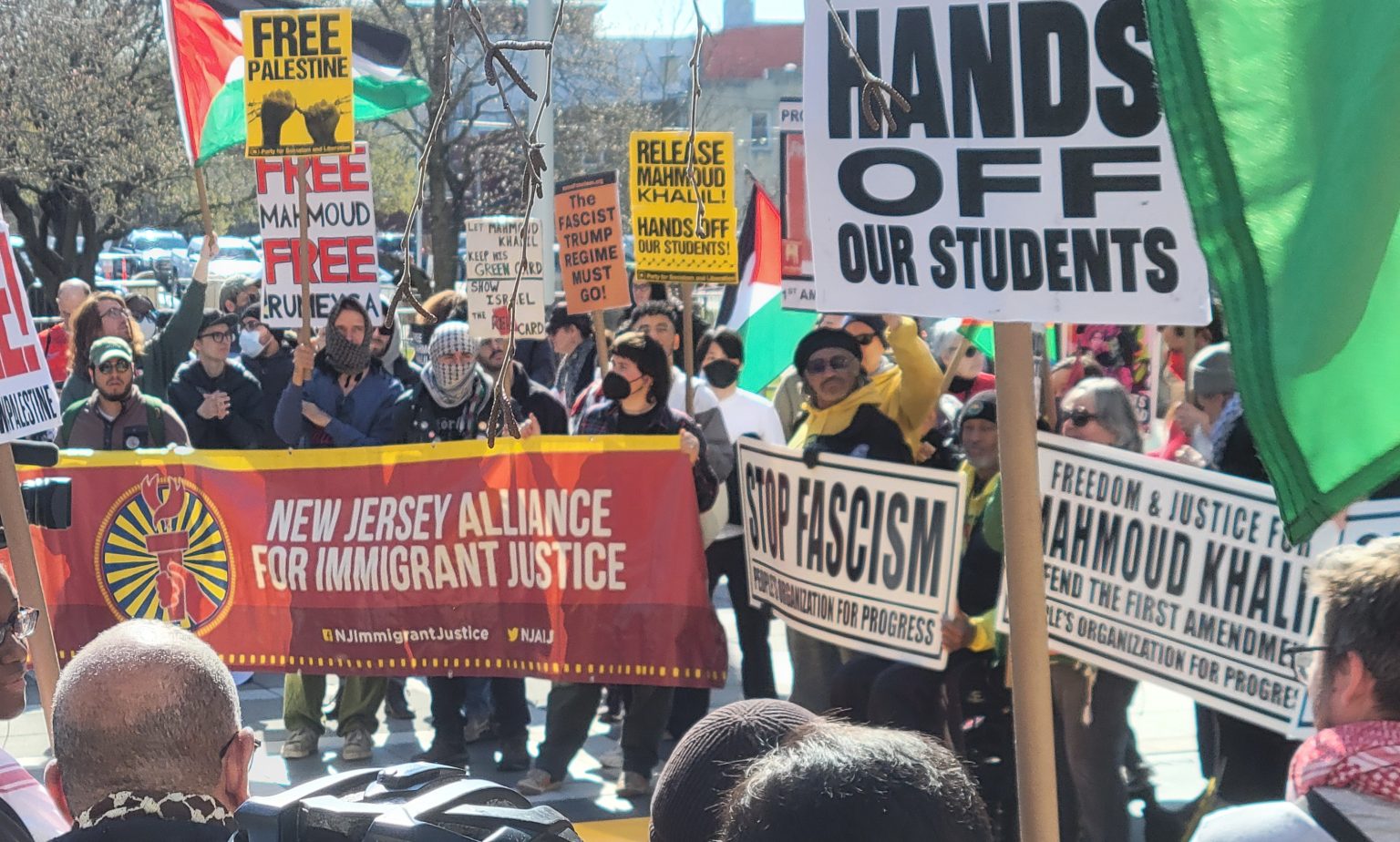The Palestine movement, immigrant rights groups, and community members gathered together in Newark, NJ on March 28, 2025 to protest the detention of Mahmoud Khalil. (Photo: Sam Carliner)
Earlier this month, Pew released a survey showing 53% of Americans now hold an unfavorable view of Israel, up from 42% in 2022.
Declining support for Israel has been a consistent theme of such polling in recent years, particularly among Democratic voters. However, despite the numbers, most elected officials remain firmly committed to Israel.
We’ve seen this disconnect on full display in recent weeks, as Democratic politicians have attempted to counter the Trump administration’s agenda. Despite Trump’s extreme suppression of the Palestine movement, only a small number of Congress members have taken a firm stance on the issue, preferring to omit Gaza, and the goals of protesters, from their critiques.
Mondoweiss U.S. correspondent Michael Arria spoke with political consultant Peter Feld about the recent polling, the opposition to Trump, the New York mayoral race, and whether Israel will end up factoring into the midterms.
There’s a recent Pew poll that shows support for Israel has dropped significantly since 2022. What did you make of those findings and what stood out to you about the data?
I think one of the important things is to put polls in the context of other surveys. When you ask about an issue in different ways, sometimes you get very different results.
However, in multiple polls on Israel, we are seeing the same trend. There’s that Pew poll from April that looks at favorability, and shows that Israel has a 53% negative rating, which is the majority of Americans’ overall unfavorable viewpoint. That’s an 11 point increase since March 2022. In March there was a Gallup poll that showed only a 43% minority of Americans now side with Israel over the Palestinians, and that Democrats side with Palestinians over Israel by 59% to 21%. Then you go back to the CBS/YouGov survey from June of last year, which showed that 61% of Americans wanted to stop sending arms to Israel.
When you look at the Pew crosstabs by party and age, there are some really striking findings that are worth paying attention to.

Over two thirds — 69% — of Democrats now have an unfavorable view toward Israel, and that’s up 16 points, from 53% in March 2022. You also see that the generation gap among Democrats has almost completely disappeared. It used to be mainly younger Democrats with an unfavorable view of Israel, but now there’s only a slight gap. Among Democrats under 50, 71% are unfavorable toward Israel. With Democrats age 50 and over it’s pretty similar: 66% are unfavorable toward Israel.
If you compare March 2022 to now, the younger Democrats have become more unfavorable, going from 62% to 71%—a 9% increase. But among Democrats 50 and over, it went from 43% unfavorable to 66% unfavorable, meaning a 23% jump in unfavorable attitudes toward Israel among older Democrats. That’s a much bigger shift. Older Democrats are now more or less indistinguishable within the margin of error from the younger Democrats. So that generation gap has disappeared.
Then you look at Republicans. Only 37% of Republicans are unfavorable toward Israel. Still, that’s a 10-point jump from 2022, when it was only 27%. But look among younger Republicans—that’s where the jump has occurred. In March 2022, younger Republicans were only 35% unfavorable toward Israel. Now, it’s 50%. Israel has lost the older Democrats, it’s lost the younger Republicans. All it has left now are the older Republicans.
So the propaganda on Israel since October 7 just hasn’t worked. The media blackout also hasn’t worked, what’s happening in Gaza has really penetrated. The repression also hasn’t worked.
The harsh repression we see now is a direct inverse of these bad polling numbers for Israel. The more people are deported, fired, have their grants canceled, have their events canceled, the more universities crack down on student protesters to impress Donald Trump or Elise Stefanik, the more it’s driving people away from Israel and towards a more sympathetic view towards Palestinians.
We are seeing that Israel can’t repress its way to popularity.
During the first weekend of April, there was a big protest in DC over Gaza. There were also thousands of “HANDS OFF!” rallies across the country, broadly opposing the Trump/Musk agenda. The major organizers of those events were the 50501 movement, the Indivisible movement, and the Women’s March.
These groups identified a long list of progressive issues they were fighting for, but did not include Gaza. At some of the actual protests, the issue was represented and referenced, but there was clearly a certain level of disconnect between the organizers and the actual protesters.
Can you talk about that disconnect? Why aren’t progressive organizations bringing up the issue when the polling shows us people oppose U.S. support for the genocide?
I think the organizers of those events are partially responding to the repression. But it’s not going to work because of these numbers that we’ve been going over. The people who show up to these protest actions are very likely to support Palestine. One of the things that’s driving turnout to these actions is Trump and ICE seizing people off the street for expressing those points of view that the base agrees with.

I think when organizers are repressing the expression of Palestine solidarity at these events, it’s because they have many ties to the institutional Democrats, the ones in Congress, the lawmakers that we’re gonna talk about. They’re trying to accommodate the Zionist sensibilities of establishment Democrats.
They’re also thinking back to 2017, when there was a lot of fracturing among the coalition at the Women’s March over the issue of Israel. But I go back to the polling here. They’re going to have to get out of the way of a fast-moving train.
We had that Pew poll this month. Last month, we had a Gallup poll showing a minority of Americans — still a 46% to 33% plurality — sympathize with Israel over Palestine. But among Democrats, it’s just blown out. 59% side with Palestine and only 21% side with Israel. That’s three-to-one, a huge reversal.

There is no way that the organizers of these events are going to be able to keep the lid on a boiling pot of three-to-one sympathy with Palestine over Israel. They just won’t be able to do it.
We saw it again last year, the CBS/YouGov poll from June 2024, where 61% of Americans said they wanted the U.S. to stop sending Israel weapons. Among Democrats, that was 77%. Among Black Americans, that went up to 75%.

So, it’s young and old. It’s Black people. Over 60% of Latino voters wanted to stop sending Israel weapons. It’s the whole Democratic coalition.
All these polls show the same thing and it’s why the repression is intensifying — and it shows why repression can’t work.
Let’s get to the lawmakers. Senator Chris Van Hollen went to El Salvador last week to visit Kilmar Abrego Garcia and try to get him released. We just saw a delegation of Massachusetts congress members go to Louisiana, where Rümeysa Öztürk and Mahmoud Khalil are being held. Senator Peter Welch visited Mohsen Mahdawi.
There have been some others, but the majority of Democratic lawmakers aren’t opposing Trump’s policies in this kind of direct way. You certainly don’t see politicians like Schumer or Gillibrand going to bat for their many constituents who have been targeted. What have you made of the Democratic response to Trump on these issues, and why aren’t more Democrats doing this?
There’s a complete split among establishment Democratic leaders. If you look at the public opinion, there was another poll that came out from FIRE that shows just one quarter of Americans want people deported for supporting Palestine. Once again, public opinion is with Palestine.

But when you get to people like Schumer and Gillibrand, their constituency is their donors. Their constituents are the pro-Israel establishment, there’s no way that they are going to stick their necks out.
Chris Van Hollen is an interesting case because when he ran for Senate, he was not the one supported by the Palestinian community in his Senate election. Donna Edwards was considered to be the stronger supporter of Palestine, and braver than him on the issue.
So he’s a pleasant surprise in all of this. He’s obviously seen the need for this and he’s going to reap political benefits. Other people are going to try to get behind this now.
For instance, Cory Booker says he wants to go to El Salvador now. Cory Booker was basking in the glow of his 25-hour filibuster in which he praised the IDF and didn’t condemn anything that Israel’s done in Gaza. He was the hero for a few days, and now he’s been eclipsed by Van Hollen, who did something much more transformational than talking at night in an empty Senate chamber.
I think other politicians will do this, but I don’t think you’ll get the Schumers and Gillibrands of the world to join in.
We’ve talked about this before, but until somebody loses an election over supporting Israel too much, I don’t see it changing.
I would direct you toward the upcoming primaries next year. Everybody is expecting next year to be a very active year in Democratic primaries because the base is so angry at the Democrats for doing so little. First, when they had power under Biden, and now in opposing Trump.
There will be a few elections where Israel will be on the ballot and one of them as soon as two months from now, in the Democratic primary for mayor in New York City, where you’re you know you’re going to have a clear split between the top two candidates, Andrew Cuomo and Zohran Mamdani.
Can you talk about that race a little?
I think there will be congressional primaries next year where the issue of Israel comes up, but the New York race is sooner, and it’s more crystallized around Israel than most of them are.
Cuomo has always been a huge, shameless panderer to Israel. During the Israeli attacks on Gaza in 2014, he went to Israel and posed in a tunnel. He issued an executive order saying that anybody who’s part of an Israel boycott can’t do business with the state of New York. He bellowed, in his typical uncharming style, “If you boycott Israel, New York state will boycott you.”
Assemblyman Zohran Mamdani from Queens, who is running for mayor in the June 24 Democratic primary, is well-known in Palestine activist circles. He introduced the Not On Our Dime bill, which would stop New York State from subsidizing illegal settlements in the occupied West Bank.
He’s taken some hits from it, but he’s thriving in the mayor’s race. He has surged above every other challenger except for Cuomo.
He just gave an interview to Politico where he was extremely forthright about everything that he’s done on Palestine, including reaffirming the reasons why he supports BDS.
So you have an openly pro-BDS candidate, who is running against someone who tried to outlaw BDS.
I think Cuomo and some of the other candidates are expecting that Mamdani’s support for Palestine in the end is going to hold him back and allow other candidates to get past him.
However, you’ll remember that Andrew Yang was the mayoral front runner for many months in 2021, and he lost his front runner status after issuing a very belligerent, pandering tweet in support of Israel. That is really considered the turning point, when all the air started to go out of the balloon of his campaign.
I would also say that the 59% to 21% sympathy for Palestine over Israel seen among Democrats nationwide in that Gallup Poll is probably not too far from the reality in New York, even though people think New York has different dynamics because there are so many engaged constituencies for Israel and for Palestine.
I think Cuomo’s attempt to Israelize the election is going to backfire. This could actually help give Mamdani the further strength to overtake him. If that happens, I think it’s going to set the table for some of the primaries next year.
Let’s talk about AIPAC. They just launched attack ads against the senators who backed Bernie’s resolutions aiming to block a weapon sale to Israel. They obviously had some big victories last time around, with the ousting of Bush and Bowman, but what’s the current state of AIPAC and the wider pro-Israel movement?
AIPAC traditionally has not used Israel as an issue when they’ve done all those independent expenditure campaigns, like the ones against Bowman and Bush.
I think there are a lot of people that are afraid that AIPAC is going to come into their district with tens of millions of dollars to spend against them, but they might be less worried that being attacked over Israel is actually going to hurt them, especially depending on what constituency they’re running in and if they’re running in a Democratic primary or if they’re running in purple state general election.
Going back to New York, there’s a local AIPAC-type group called Solidarity PAC. They do tend to attack Palestine supporters over Israel, and I’m not sure it always works. We’re going to soon see how effective it is up against 3-to-1 support for Palestine among Democrats.
People who support Palestine are going to have to find a way to take that margin to the bank and cash it in by electing people who support Palestine and defeating people who’ve been on the forefront of supporting Israel.
Schumer and Gillibrand are very lucky because neither of them has an election in the next cycle. Gillibrand was just reelected with no Democratic opponent and, in retrospect, it was probably a mistake for AOC to pass up the chance of challenging her because Gillibrand is a very unimpressive Senator. She’s on the forefront of supporting crypto and she’s been steadfast in supporting Israel. She’s a part of the Abraham Accords Caucus.
Schumer’s election is up sooner, he’s up in 2028. It’s widely expected that AOC is in a strong position to challenge him, according to polling. We will see when and if that ever starts affecting his actions.
I don’t think AIPAC is going to be able to hold back this tide of Democrats who side with Palestine.
What should we make of this recent announcement from Democratic National Committee vice chair David Hogg, that he’s going to fund primary challengers against some Democratic incumbents? Do you think Israel is going to factor into any of this?
I haven’t seen Hogg bring up Palestine yet. I think that he has some of the same limitations that the “Hands Off!” organizers do. They’re trying to thread the needle and stay acceptable to the Democratic establishment and not fracture their coalitions. But they’re not going to be able to hold back support for Palestine, either because you’re going to get individual candidates who are going to step up on this issue and they won’t necessarily be all driven by David Hogg, as much as I respect his move to primary Democrats.
Most of his argument comes from this idea that lawmakers aren’t standing up to Trump sufficiently. That’s true and understandably has a lot of resonance, but that critique can’t ignore the fact that Trump is deporting people over Palestine with only 25% support from the population.
Let’s see what someone like Maxwell Frost does. Mondoweiss did a very in-depth piece about Maxwell Frost’s election win. He was this Gen-Z darling for left-leaning Dems and he completely abandoned Palestine in his first race for Congress. Just completely distanced himself from the activists that he’d been working with. He’s come back around, and some of his votes have been good, but there’s still this attempt to thread the needle.
I think it’s going to take very brave challengers who aren’t necessarily answering to people like David Hogg but are actually out there talking about the issue. That’s why I just keep coming back to Zohran Mamdani. He’s not going to moderate his views on things like BDS. He’s not backtracking. And we already see how the threat of a challenge from Kat Abughazaleh, a Palestinian insurgent candidate, helped pressure Congresswoman Jan Schakowsky into dropping her reelection campaign.
Next year we will likely see more challengers really standing up for Palestine. If one or two of them wins, it’s going to have a really dramatic impact on the Schumers and Gillibrands of the world.
We have seen all these draconian moves from Trump, these attempts to really cripple the domestic Palestine movement. I am wondering if you had any thoughts on why this is such a focus for the administration? What is so threatening to the U.S government about more and more people criticizing Israel?
Israel has always been a difficult proposition because it was a settler colonial outpost in the Middle East. People like Hakeem Jeffries always say things like, “Well, Israel is in a bad neighborhood.” (“Who chose the bad neighborhood?” Philip Weiss once asked.)
I would say the U.S. imperial project requires Israel, so the establishment will not back off from Israel, regardless of public opinion, unless it’s forced to, and it’s going to take a lot more force than we’ve seen so far.
Groups like AIPAC or lawmakers like Trump can’t maintain support for the Israeli project without all this repression. They understand that, unless people are scared to speak out on Palestine, they will naturally speak out on Palestine.
They’ve gone after the most vulnerable. They’ve targeted students, green card holders, other immigrants, and even tourists in some cases. They’re talking about sending citizens to a foreign prison.
I don’t think Trump cares about public opinion. Just look at what he’s done to the markets with the tariffs, he doesn’t care. He certainly doesn’t care what people think about Israel and Palestine. He doesn’t care about public opinion when it comes to the deportations. I think he feels like he’s got control of the government and he will not give it up through the usual means. I don’t even think he cares about the midterms.
It goes beyond Trump. There’s a presumption throughout the press, the more mainstream and conservative press, that the public sides with Israel — when all these numbers show it doesn’t.
There’s also the key issue of Christian Zionism, which Marco Rubio is part of. Trump isn’t really a part of it, but he’s happy to exploit it, and a lot of the MAGA movement is in the grip of evangelical Christian Zionists.
These people are completely comfortable making common cause with white supremacists, Christian nationalists, even Nazi sympathizers, to attack Palestine. It even fits into their wider project of destroying academia. They’re talking about toppling universities. They’re talking about defunding Columbia, defunding Harvard, and using antisemitism as their weapon.
The other reason why they focus so much on repressing pro-Palestine protest is because they’ve had success with these tactics going back to the congressional hearings last summer, when multiple university presidents knuckled under and completely acquiesced to the Republican MAGA definition of antisemitism, which is also the IHRA working definition of antisemitism.
When they watch these universities knuckle under, call the police on their own students, revoke degrees, and expel students, they see that it works. They keep doing it because it’s now a proven technique for them.
It’s going to take an escalated pushback, and those of us who support Palestine need to seize the moment. People can’t temper their activism.














